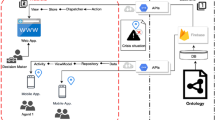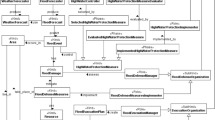Abstract
Crisis situations are highlighted by the involvement of various emergency response organizations aiming at saving lives and reducing crisis impacts. However, this variety makes communication and information sharing challenges rise. The use of semantic Web technologies has been recognized as a suitable solution to address these challenges. This paper proposes an ontology-based representation of crisis situations providing a unified and sharable knowledge base between crisis response stakeholders. The developed ontology, named CROnto (Crisis Response Ontology), merges three pertinent aspects of the domain of crisis response. First, crisis features which represents crisis characteristics. Second, crisis effects which describes the various impacts that could be engendered by a disaster. Third, crisis response which represents strategic response plans. For the purpose of evaluating CROnto ontology, we adopt criteria-based evaluation approach.
Access this chapter
Tax calculation will be finalised at checkout
Purchases are for personal use only
Similar content being viewed by others
References
Diniz, V.B., Borges, M.R., Gomes, J.O., Canós, J.H.: Decision making support in emergency response. In: Encyclopedia of decision making and decision support technologies. pp. 184–191. IGI Global (2008)
Liu, S., Brewster, C., Shaw, D.: Ontologies for crisis management: a review of state of the art in ontology design and usability. In: ISCRAM (2013)
Fan, Z., Zlatanova, S.: Exploring ontologies for semantic interoperability of data in emergency response. Appl. Geomat. 3, 109–122 (2011)
Grimm, S., Abecker, A., Völker, J., Studer, R.: Ontologies and the semantic web. In: Domingue, J., Fensel, D., Hendler, J.A. (eds.) Handbook of Semantic Web Technologies, pp. 507–579. Springer, Heidelberg (2011). https://doi.org/10.1007/978-3-540-92913-0_13
Haghighi, P.D., Burstein, F., Zaslavsky, A., Arbon, P.: Development and evaluation of ontology for intelligent decision support in medical emergency management for mass gatherings. Decis. Support Syst. 54, 1192–1204 (2013)
Yu, J., Thom, J.A., Tam, A.: Evaluating ontology criteria for requirements in a geographic travel domain. In: Meersman, R., Tari, Z. (eds.) On the Move to Meaningful Internet Systems. LNCS, pp. 1517–1534. Springer, Heidelberg (2005). https://doi.org/10.1007/11575801_36
Kontopoulos, E., et al.: Ontology-based representation of crisis management procedures for climate events. In: Boersma, K., Tomaszewski, B. (eds.) ISCRAM 2018 Conference Proceedings – 15th International Conference on Information Systems for Crisis Response and Management, pp. 1064–1073. Rochester Institute of Technology, Rochester (2018)
beAWARE Project Homepage. https://beaware-project.eu/
Bitencourt, K., Durão, F.A., Mendonça, M., Santana, L.L.B.D.S.: An ontological model for fire emergency situations. IEICE Trans. Inf. Syst. 101, 108–115 (2018)
Barros, R., Kislansky, P., Salvador, L., Almeida, R., Breyer, M., Pedraza, L.G.: EDXL-RESCUER ontology: conceptual model for semantic integration. In: ISCRAM (2015)
RESCUER Project Homepage. http://www.rescuer-project.org/
Limbu, M., Wang, D., Kauppinen, T., Ortmann, J.: Management of a crisis (MOAC) vocabulary specification. http://observedchange.com/moac/ns/
Shelter Cluster Homepage. https://www.sheltercluster.org/
UNOCHA Homepage. https://www.unocha.org/
USHAHIDI Homepage. https://www.ushahidi.com/
Babitski, G., Probst, F., Hoffmann, J., Oberle, D.: Ontology design for information integration in disaster management. GI Jahrestag. 154, 3120–3134 (2009)
Bénaben, F., Hanachi, C., Lauras, M., Couget, P., Chapurlat, V.: A metamodel and its ontology to guide crisis characterization and its collaborative management. In: Presented at the Proceedings of the 5th International Conference on Information Systems for Crisis Response and Management (ISCRAM), Washington, DC, USA, May 2008
Holsapple, C.W., Joshi, K.D.: A collaborative approach to ontology design. Commun. ACM 45, 42–47 (2002)
Othman, S.H., Beydoun, G., Sugumaran, V.: Development and validation of a disaster management metamodel (DMM). Inf. Process. Manag. 50, 235–271 (2014). https://doi.org/10.1016/j.ipm.2013.11.001
UN General Assembly: Report of the open-ended intergovernmental expert working group on indicators and terminology relating to disaster risk reduction, p. 41. UN General Assembly, New York, USA (2016)
World Health Organization: ReliefWeb glossary of humanitarian terms (2008)
Blanchard, B.W.: Guide to emergency management and related terms, definitions, concepts, acronyms, organizations, programs, guidance, executive orders and legislation: a tutorial on emergency management, broadly defined, past and present. Federal Emergency Management Agency, USA (2008)
Protégé: A free, open-source ontology editor and framework for building intelligent systems (2013)
McGuinness, D.L., Van Harmelen, F.: OWL web ontology language overview. W3C Recomm. 10 (2004)
Mizoguchi, R., Vanwelkenhuysen, J., Ikeda, M.: Task ontology for reuse of problem solving knowledge. Very Large Knowl. Bases Knowl. Build. Knowl. Shar. 46, 45 (1995)
Gruber, T.R.: Toward principles for the design of ontologies used for knowledge sharing? Int. J. Hum. Comput. Stud. 43, 907–928 (1995). https://doi.org/10.1006/ijhc.1995.1081
Gómez-Pérez, A.: Towards a framework to verify knowledge sharing technology. Expert Syst. Appl. 11, 519–529 (1996)
Mohamed Shaluf, I.: Disaster types. Disaster Prev. Manag. Int. J. 16, 704–717 (2007)
Author information
Authors and Affiliations
Corresponding author
Editor information
Editors and Affiliations
Rights and permissions
Copyright information
© 2019 Springer Nature Switzerland AG
About this paper
Cite this paper
Bannour, W., Maalel, A., Ben Ghezala, H.H. (2019). Ontology-Based Representation of Crisis Response Situations. In: Nguyen, N., Chbeir, R., Exposito, E., Aniorté, P., Trawiński, B. (eds) Computational Collective Intelligence. ICCCI 2019. Lecture Notes in Computer Science(), vol 11684. Springer, Cham. https://doi.org/10.1007/978-3-030-28374-2_36
Download citation
DOI: https://doi.org/10.1007/978-3-030-28374-2_36
Published:
Publisher Name: Springer, Cham
Print ISBN: 978-3-030-28373-5
Online ISBN: 978-3-030-28374-2
eBook Packages: Computer ScienceComputer Science (R0)




